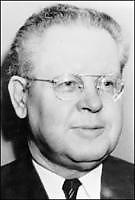|
| Affiliation | Republican |

|
| <- |
1940-01-01 |
|
|
| Name | Ralph L. Carr |
| Address |
Antonito, Colorado , United States |
| Email | None |
| Website | None |
| Born |
December 11, 1887
|
| Died | September 22, 1950
(62 years)
|
| Contributor | eddy 9_99 |
| Last Modifed | BrentinCO
Jul 22, 2018 03:17pm |
| Tags |
|
| Info | Ralph Carr was born in 1887. His father was a miner, and the family moved around to several Colorado towns, including Aspen and Cripple Creek. After graduating from Cripple Creek High School in 1905, Ralph went on to study law, earning his law degree in 1912. His law practice took him to the town of Antonito in southern Colorado.
After living in Antonito for 11 years, Ralph, his wife, Gretchen, and their two adopted children, Robert and Cynthia, moved to Denver. It was very different from the small towns Ralph had lived in most of his life. Ralph had become a very well-respected lawyer, and when he moved to Denver he became Assistant Attorney General. In 1929, he was appointed by President Herbert Hoover to serve as U.S. Attorney for Colorado. During this time, Gretchen died, and Ralph continued raising their two children alone. Eleven years after Gretchen’s death, Ralph married Eleanor Fairall.
In 1938, Ralph decided to run for Governor of Colorado and won. Three years later the United States entered World War II when Japan attacked Pearl Harbor, in Hawaii, on December 7, 1941. After the attack, many Americans began to distrust Japanese Americans, even those who were United States citizens, fearing that they might be spies. Because of this, the United States government forced thousands of Japanese Americans, mostly from California, to leave their homes and live in “internment camps.” However, unlike many others, Ralph Carr believed in Japanese Americans’ loyalty, and he did not send Japanese Coloradans to the camps. He believed that the Constitution protected all Americans.
When he ran for the U.S. Senate in 1942, Ralph lost the election,5 and some say this was because of his support for Japanese Americans. He decided to run for governor again in 1950, but he died just a month before the election. He was 62 years old. Soon after his death, Coloradans began to recognize that he had been right, that there were no cases of Japanese spies in America. Today, Ralph Carr is remembered as someone who stood up for the rights of others, even when his view was not popular. He has been memorialized in a statue in Denver’s Sakura Square and in the naming of the Ralph Carr Memorial Highway and the new Ralph Carr Judicial Center in downtown Denver. In 1999, the Denver Post named him Colorado’s “Citizen of the Century.”
Ralph Carr is also memorialized by a plaque in the State Capitol that reads, “Dedicated to Governor Ralph Carr as a wise, humane man, not influenced by hysteria and bigotry directed against the Japanese Americans during World War II. By his humanitarian efforts, no Colorado resident of Japanese ancestry was deprived of his basic freedoms, and when no others would accept the evacuated West Coast Japanese, except for confinement in internment camps, Governor Carr opened the doors and welcomed them to Colorado. The spirit of his deeds will live in the hearts of true Americans.”
[Link] |
 | BOOKS |
 |
|
| Title |
Purchase |
Contributor |
|
| Start Date |
End Date |
Type |
Title |
Contributor |
|
| Date |
Category |
Headline |
Article |
Contributor |
|
|

